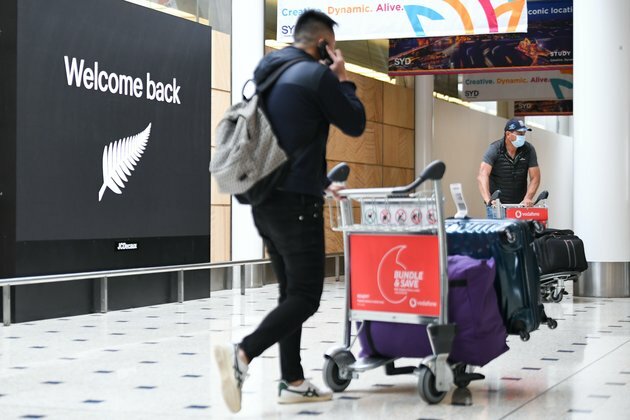Before we introduce vaccine passports we need to know how they'll be used
The Conversation
02 Mar 2021, 02:08 GMT+10

Air New Zealand is to trial digital "vaccine passports" on trans-Tasman routes in April. A media release says: "The goal is to enable customers to seamlessly manage their digital travel documentation throughout their travel experience."
And it's easy to see why. Airlines want people back in the air, the tourism industry wants them back in their hotels, restaurants and rental cars. And many of us have family and friends overseas - my daughter is having a baby in Melbourne in July and I want to visit!
The airline will be using the Travel Pass app offered by the International Air Transport Association (IATA), which it says has been "developed with the highest levels of data privacy and security".
But vaccine passports bring significant risks. We should identify those risks and what we are going to do about them before wholesale introduction.
Unequal access to passports
The use to which a vaccine passport might be put is key. Air New Zealand is interested in trans-Tasman travel, but without clear controls in place it seems very likely there will be pressure to expand reliance on them.
Elsewhere we have seen suggestions they be used to control access to or participation in a range of places and activities with a risk of COVID transmission - sporting events, public venues, even workplaces.
Read more: A COVID 'vaccine passport' may further disadvantage refugees and asylum seekers
Why would that matter? If they are good for airlines, wouldn't they be good in other contexts, too? One reason to worry is that vaccines - and therefore vaccine passports - will not be available to everyone.
Some access issues are matters of global justice. The citizens of many countries will not have access to vaccines in the near future. As is often the case, people who are already disadvantaged will bear further burdens.
Who gets a passport first?
Perhaps this will seem all too remote and idealistic, but there will be domestic versions of these concerns too.
Some New Zealanders might be unable or unwilling to have COVID vaccines because of existing health conditions. On current roll-out plans, others will have to wait in line behind prioritised groups such as border, quarantine and health workers.
There will also be people who choose not to be vaccinated because of principled objections to vaccination, but we can perhaps put that group aside for the moment. Any disadvantage they suffer will at least have been willingly taken on.
So the significance of access to vaccination - and vaccine passports - will depend crucially on the limits placed on their use.
If it simply prevents people travelling to Australia, or makes such trips more burdensome, society might tolerate the discrimination unequal access will cause. If it affects people's capacity to socialise, work or travel domestically, it will be a more serious issue.
How reliable will passports be?
Other potential risks flow from the fact a variety of vaccines will be available and new COVID strains will emerge regularly. If the vaccines are not all equally effective, or more infectious new variants of the virus affect their performance, how will vaccine passports reflect this?
We might assume vaccine passports give those relying on them - whether officials administering travel permissions or fellow passengers - evidence of the risk posed by a passport holder. But it may be that not all passport holders are equally immune.
If there are doubts a passport truly means its holder has had an effective vaccine or has immunity against some recent strain, the value of the passport diminishes. We may still have cause to worry about the risk posed by the person in the seat next to us.
Read more: A vaccine will be a game-changer for international travel. But it's not everything
As with any digital system, there will be privacy and information security issues too. Air New Zealand has described the proposed Travel Pass as "a place to store all your health credentials digitally in one place".
It seems unlikely it would hold that much information - we haven't achieved that with hospital-based electronic health records - and that would be a good thing.
A set of standards would no doubt address what information was held on the app and who it could be shared with. We should have those standards in place before we allow passports.
New age, new risks
It has been pointed out that vaccine passports are not new: the World Health Organisation's "yellow card", an international certificate to record inoculations against yellow fever, cholera, typhus and smallpox has been around since the 1930s.
But it's not clear what we should make of the example. The yellow card might pose significant ethical risk, too, if access to vaccines is unequal or there are concerns about the reliability of cards.
As serious as these diseases are, they are rare or endemic to certain areas: the scale of the COVID pandemic makes some ethical risks more likely and more pressing. Some of those risks flow from vaccine passports being proposed in a digital age, where information can be held and shared in ways unimaginable only a couple of decades ago.
Furthermore, the yellow card has the backing of international health regulations that specify conditions for validity.
No shared standards
Finally, vaccination passports seem likely to vary in an important way from the passports we know best. The value of regular passports rests on the shared international standards that lie behind them.
If I produce a valid passport, an immigration official knows I am a New Zealand citizen, that my identity has been confirmed, that my passport photo is a reasonable likeness, and so on.
There are no such shared standards for vaccine passports, so it is much less clear what can be assumed about the passport holder. The very thing that makes passports valuable might not be true of a vaccine passport.
The point here is not that vaccine passports are a bad idea. They might be an important part of managing COVID. But we should be clear about the risks such passports pose and about how we are going to manage those risks before they get a foot in the door.
Author: Tim Dare - Professor of Philosophy, University of Auckland 
 Share
Share
 Tweet
Tweet
 Share
Share
 Flip
Flip
 Email
Email
Watch latest videos
Subscribe and Follow
Get a daily dose of New Jersey Telegraph news through our daily email, its complimentary and keeps you fully up to date with world and business news as well.
News RELEASES
Publish news of your business, community or sports group, personnel appointments, major event and more by submitting a news release to New Jersey Telegraph.
More InformationBusiness
SectionMeta hires SSI CEO Gross as AI race intensifies among tech giants
PALO ALTO/TEL AVIV: The battle for top AI talent has claimed another high-profile casualty—this time at Safe Superintelligence (SSI),...
Engine defect prompts Nissan to recall over 443,000 vehicles
FRANKLIN, Tennessee: Hundreds of thousands of Nissan and Infiniti vehicles are being recalled across the United States due to a potential...
Microsoft trims jobs to manage soaring AI infrastructure costs
REDMOND, Washington: Microsoft is the latest tech giant to announce significant job cuts, as the financial strain of building next-generation...
Stocks worldwide struggle to make ground Friday with Wall Street closed
LONDON UK - U.S. stock markets were closed on Friday for Independence Day. Global Forex Markets Wrap Up Friday with Greeback Comeback...
Nvidia briefly tops Apple’s record in AI-fueled stock rally
SANTA CLARA, California: Nvidia came within a whisker of making financial history on July 3, briefly surpassing Apple's all-time market...
ICE raids leave crops rotting in California, farmers fear collapse
SACRAMENTO, California: California's multibillion-dollar farms are facing a growing crisis—not from drought or pests, but from a sudden...
International
SectionUS sends message by publicizing visa ban on UK punk-rap band
WASHINGTON, D.C.: The Trump administration has made public a visa decision that would usually be kept private. It did this to send...
Tragedy in Spain: Diogo Jota and his brother die in car accident
MADRID, Spain: Liverpool footballer Diogo Jota and his younger brother, André Silva, have died in a car accident in Spain. Spanish...
Early heatwave grips Europe, leaving 8 dead and nations on alert
LONDON, U.K.: An unrelenting heatwave sweeping across Europe has pushed early summer temperatures to historic highs, triggering deadly...
U.S. military, China, Russia in Space race
President Donald Trump's plans to build a space-based Golden Dome missile defense shield have drawn immediate criticism from China,...
Trump wins $16 million settlement from Paramount over CBS Harris edit
NEW YORK CITY, New York: Paramount has agreed to pay US$16 million to settle a lawsuit brought by U.S. President Donald Trump over...
British PM faces major party revolt over welfare reforms
LONDON, U.K.: British Prime Minister Keir Starmer won a vote in Parliament this week to move ahead with changes to the country's welfare...













